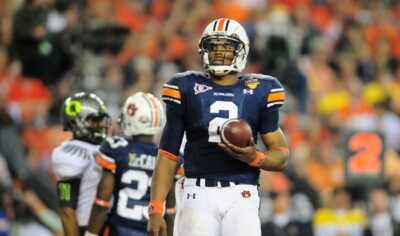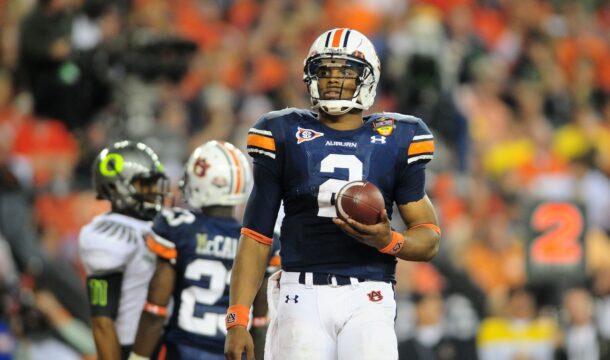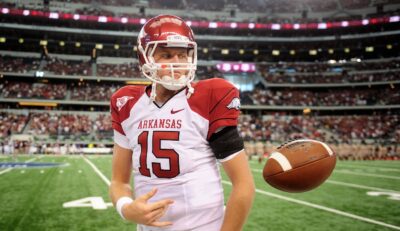Who will have the better 2015 season, Georgia’s Nick Chubb or LSU’s Leonard Fournette?
It’s akin to asking whether you’d like an all-expenses-paid vacation to Australia’s Gold Coast or a free Alaskan cruise. You may prefer a warm beach or majestic glaciers, but most would love both.
RELATED: Ranking the SEC’s top returning players: RB
It’s also an imaginative luxury that no SEC offensive coordinator has to answer. That does nothing to diminish the fun of the question and of the intellectual scrum that comes from taking sides.
The assertion that Fournette will outplay Chubb this fall seems to raise the hair on the back of many of your necks (and, judging by the banter in our office, several writers as well).
The argument immediately veers to this: Chubb ran for more yards (1,547 to 1,034), touchdowns (14 to 10) and yards per carry (7.1 to 5.5) in 2014.
Those last two words are crucial: in 2014.
Postulating that Chubb definitively will be a better back this year because he produced a better season last year is a logical fallacy. One that grows larger to every degree that it is claimed as an absolute truth. It does not follow that because Chubb was greater than Fournette in ’14, he will be better than Fournette in ’15. (Perhaps someone smarter than I can label this as post hoc or non sequitur.)
The opposite is true as well. Football isn’t a game of see-saw, where gravity dictates the top must go to the bottom in a continuous loop.
This isn’t a pro-Charles Barkley, down-with-those-analytics geeks notion. But to pin everything on stats in a vacuum without considering other factors is ignorant at best. Any argument that blanketly asserts “no contest” that Chubb will be better than Fournette this year based on last year’s stats alone should be dismissed immediately.
By that logic, entering 2014, Mississippi State’s Josh Robinson (459 rushing yards in ’13) had no business putting together a better season than Alabama’s T.J. Yeldon (1,235 yards in ’13). Robinson clearly had a more productive ’14 than Yeldon, and any excuse or quibble with that statement is to admit that you have to look beyond yardage totals when comparing running backs.
The real questions are, why was Chubb better last year? What will stay the same for each of the two players and their respective teams? And what will change?
IT STARTS WITH SPEED
Before we examine each player’s ’15 circumstances, let’s look at their individual attributes.
Listed at 5-foot-10, 228 pounds, Chubb reportedly ran a laser-timed 4.44 seconds in the 40-yard dash in high school and a 10.79-second 100-meter dash. He’s brutally fast for a player his size.
At 6-foot-1 and 230 pounds, carrying a similar build, Fournette ran 4.35 seconds in the 40-yard dash (as far as I can tell, it was hand-timed, an important detail) and a 10.68-second 100-meter dash.
On the field last year, both players were fast enough to run away from top SEC linebackers and even a number of defensive backs. Both have great burst and great long speed.
WHY CHUBB WAS BETTER IN 2014
Fournette started his college career as a bull in a china cabinet, charging into the first thing he saw. It seemed like he expected his otherworldly physique to carry him to the end zone effortlessly on every play, just as it did in high school. That led to some impatient, ill-advised early carries that lacked vision (and one premature Heisman pose). It also led to moments like this:
Chubb did not lack for power, but much like a veteran quarterback reading the defense and identifying the weakness, he did a much better job of combining all his assets — balance, cutting, speed, power — at just the precise moment without much thought.
On speed and power alone, both are elite athletes across any sport, but Fournette probably takes a razor-thin advantage. But on the field, as a football player, Chubb was the more fluid, elusive running back in ’14.
TRUE FRESHMAN CIRCUMSTANCES
Now let’s transition into their circumstances. Fournette entered as one of the most-hyped SEC recruits ever. Anything short of morphing into Adrian Peterson immediately upon arriving in Baton Rouge was going to be labeled as below expectations.
Instead of heaving him into a leading role from the outset, offensive coordinator Cam Cameron eased him into the college game, started breaking him in with runs to the edges and kickoff returns, then slowly prioritized Fournette in the backfield starting about halfway through the season.
Fournette went gangbusters in the Music City Bowl, returning a kickoff 100 yards, taking a handoff 89 yards and running for 54 yards on 10 other carries. His mostly-linear progression hit its apex at the end of his true freshman season (he also torched a vulnerable Texas A&M defense for 146 yards on 7.7 yards per carry in LSU’s regular-season finale).
Chubb began his career as a touted recruit buried behind Todd Gurley and Keith Marshall, scrounging for third-team touches with Sony Michel. Due to injuries and one headline-grabbing suspension, after carrying just 31 times in the first five games, Chubb became the starter and de facto football plow Oct. 11 at Missouri.
He touched the ball 42 times that game, pile-driving between the tackles four yards at a time on his way to 174 yards of total offense. Chubb started the next seven games as well, enduring two more contests with more than 30 touches and an additional two with more than 25 touches.
Georgia continued to jab Chubb between the tackles, but he became an explosive player as well, scoring 12 touchdowns in those final seven games and churning out at least one run of longer than 20 yards in six of them. When Chubb rumbled 33 times for 266 yards in a Belk Bowl win against Louisville, it was a continuation of his outstanding year rather than new territory.
CHUBB ALREADY HAS MAXIMIZED MUCH OF HIS POTENTIAL
Gurley and Michel returned for varying lengths of time, occasionally lifting Georgia’s mandate to Chubb to carry such a taxing load.
But he endured more bruising, up-the-middle collisions from big-bodied SEC defensive players. Also, at the rate he touched the ball during his eight starts, he would’ve amassed 330 touches during a full season. Chubb touched the ball nearly 10 times more per game than Fournette during the last eight games of their respective seasons.
No matter how strong his body, we’ve seen this year after year in major college football and in the NFL. It’s been proven. Carrying that sort of load has a measurable affect on a running back the following season.
Incidentally, as a freshman, Gurley carried just three times less than Chubb, putting up pretty comparable numbers. Though he remained a terrific player the next two seasons, he never again reached 1,000 rushing yards.
That’s not to say Chubb won’t top 1,000 yards again — remember our previous discussion on logic.
But it is to say, as remarkable as it sounds, Chubb is a more mature college running back than Fournette as of today, Feb. 18. Both players will continue to develop, especially as receivers out of the backfield and in pass protection. But whereas Fournette spent the year climbing, Chubb reached and maintained a pinnacle.
Might Fournette keep on improving in 2015 while Chubb stays more or less the same? It’s a good possibility.
FACTORS WORKING AGAINST CHUBB
In addition to the heavy workload he endured the second half of last year, there are a few other factors that could impose a ceiling on Chubb’s season.
Whereas Fournette shared the backfield with veterans Terrence Magee and Kenny Hilliard, due to the previously-discussed injuries and suspensions, Chubb had the Bulldogs’ backfield to himself for long stretches. There’s a solid chance that script will flip in ’15.
Magee and Hilliard are gone. Darrell Williams played enough last season to show he’s a promising backup, but there are fewer options for LSU. Meanwhile, Marshall, at one time a promising freshman himself, deserves one more opportunity to try to stay healthy. Michel demands touches after running for 6.4 yards per carry. And UGA arguably has the more talented group of young, unproven backups at the position.
LSU’s uninspired quarterback play, mostly from Anthony Jennings, couldn’t connect with a very talented, but inexperienced, group of receivers. The Tigers’ unimaginative play-calling often left defenses to load up against the run. That won’t necessarily make a 180 degree turn in ’15, but it seems fair to expect Cameron will get more out of the passing game. All the skill players return, a benefit for Fournette.
Meanwhile, the Bulldogs lose quarterback Hutson Mason and senior receivers Michael Bennett and Chris Conley. Mason did a surprisingly strong job of making smart decisions with the football, avoiding turnovers and throwing with accuracy. It remains to be seen whether Brice Ramsey or whomever starts this year can team up with a less-established group of pass-catchers and duplicate that effort.
UGA also is transitioning to a new offensive coordinator in Brian Schottenheimer, who developed a reputation as one of the most predictable play-callers in the NFL. It’s hard to say how those factors will affect Chubb, but it’s more likely that the overall offensive outlook at LSU will move in Fournette’s favor more than it will move in Chubb’s favor at Georgia.
Without giving a boring dissertation on offensive line analytics and how that factored into each back’s respective 2014 seasons, you can check out the Football Outsiders metrics yourself, or you can take my word for it: the Bulldogs’ offensive line gave Chubb a quantifiable advantage, and by a moderate margin.
Both teams lose an integral piece of their respective lines in LT La’el Collins (LSU) and C David Andrews (Georgia), as well as one other starter. To delve into detailed projections for each team’s ’15 offensive lines would be a bit much for this space, but suffice to say I feel like UGA may face a slight regression in run blocking as compared to LSU. Andrews was an underrated piece, the Bulldogs line in ’14 played incredible (and collectively above their talent level), and if nothing else it will be harder for Georgia to maintain last season’s play because it was so elite.
Then there’s the ’15 schedule. Fournette and LSU face what should be a weaker Mississippi State and Arkansas run defense, while Georgia and Chubb also face overlap opponents in Alabama (not on the schedule last year) and what should be an improved Auburn defense. That’s in addition to ever-scarier defensive fronts fronts in Missouri and Tennessee.
BOTTOM LINE
Both Fournette and Chubb are in line for huge 2015 seasons. But go with the man in purple-and-gold, the one with the better Heisman Trophy odds in Vegas.
(That’s despite the fact that Georgia should start the season as the higher-ranked team, a huge pre-requisite for a non-quarterback Heisman contender. What does that tell you?)
Chubb should get fewer touches per game than his torrid second half of 2014, in an offense that probably won’t give him as much help, with a skill set that gives him less room to improve.
Fournette should get more touches per game than his slow acceleration in the second half of 2014, in an offense that probably will give him more help, with a skill set that gives him more room to improve.
There’s no definitive answer to which one will be the better player during the 2015 season. A depressing thought for all of us is that one or both of them could get hurt, rendering the entire argument moot.
But one thing’s for sure, it’s going to take a much deeper look than an isolated examination of the 2014 numbers to make an educated guess.
It’ll be fun to watch both players and see how the season plays out.
An itinerant journalist, Christopher has moved between states 11 times in seven years. Formally an injury-prone Division I 800-meter specialist, he now wanders the Rockies in search of high peaks.







